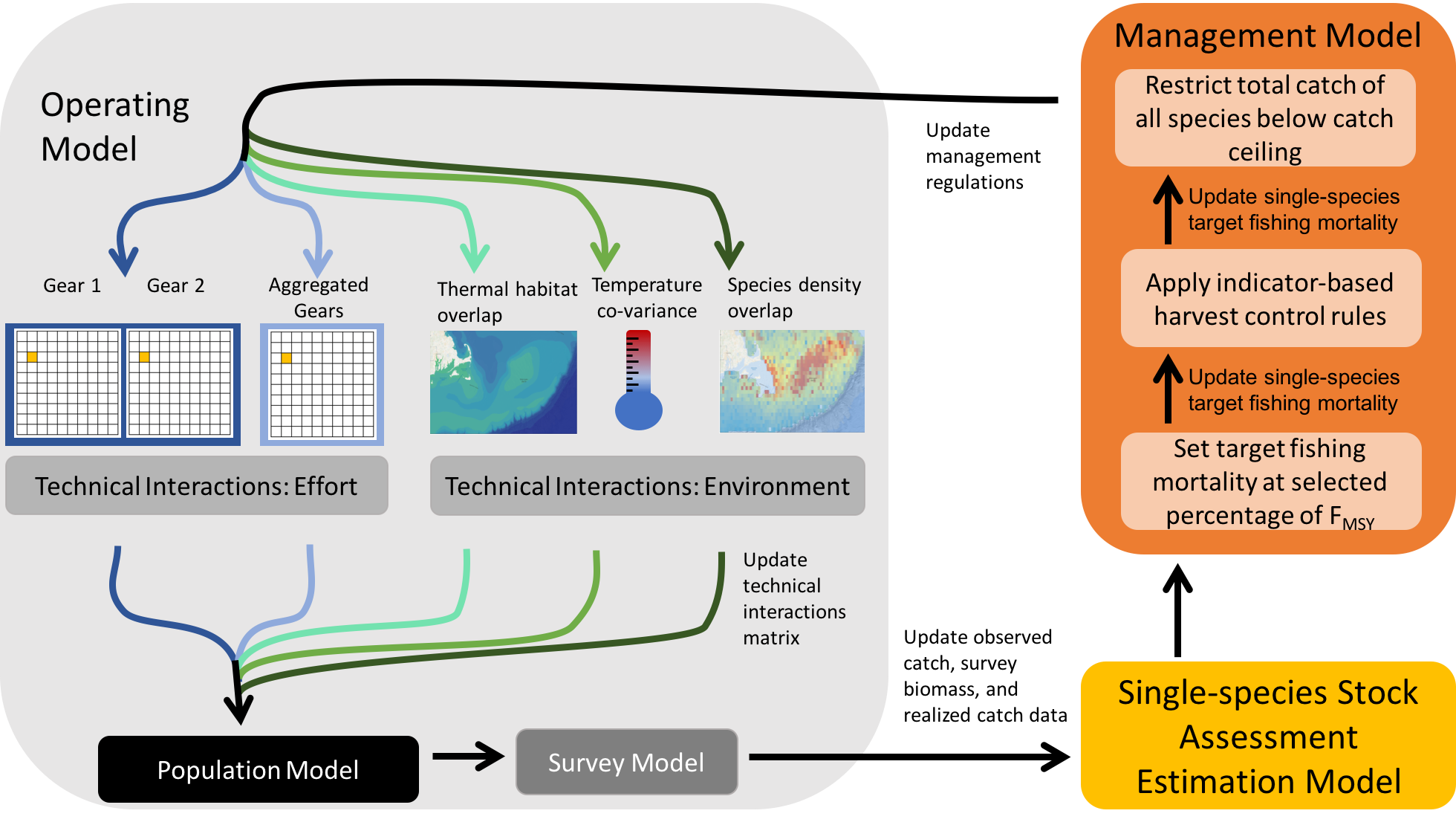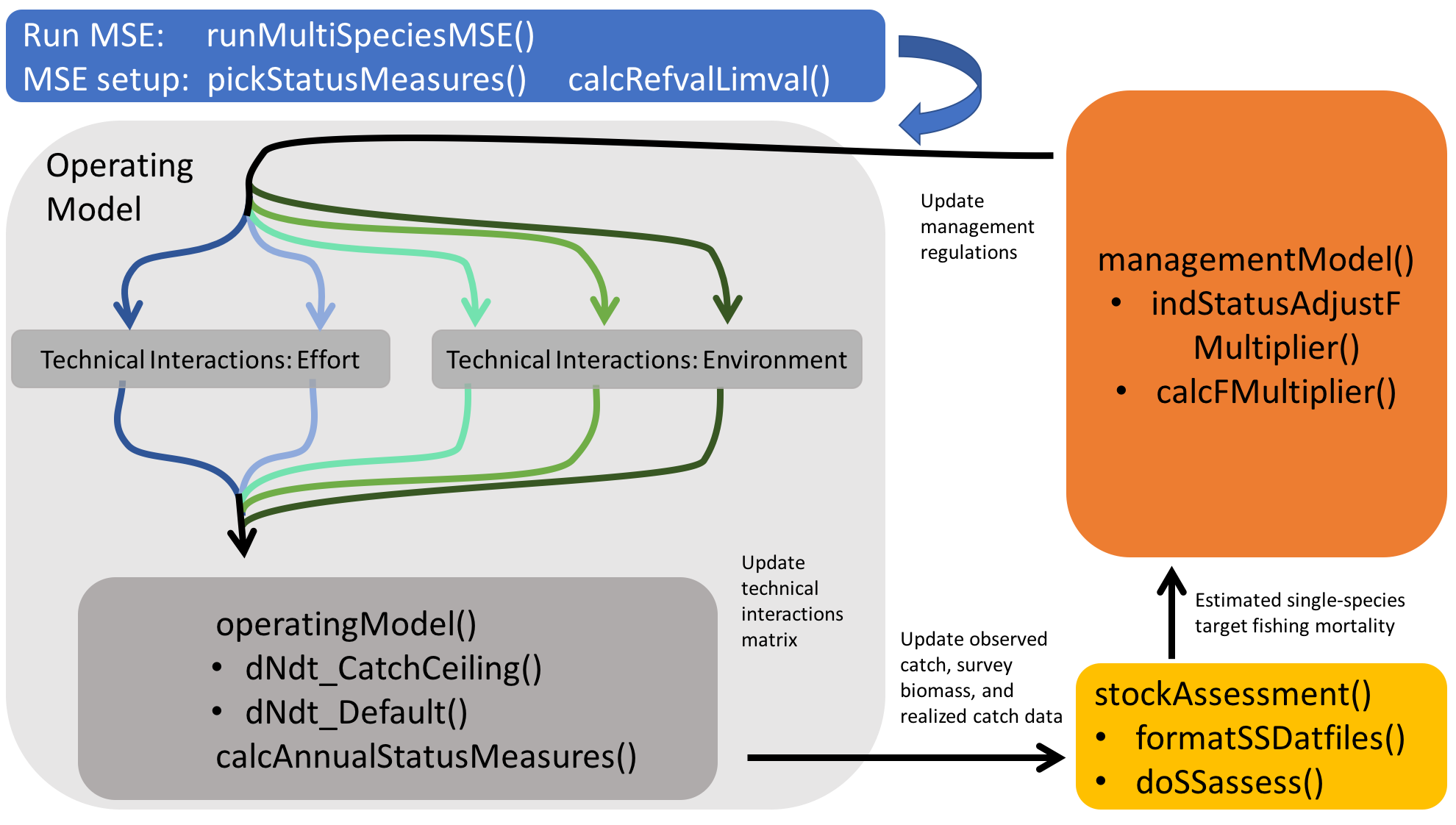ebfm_mp is a package to perform a Management Strategy Evaluation (MSE) to test Ecosystem-Based Fisheries Management (EBFM) procedures in a multi-speies context. This MSE simulation framework is broken into 3 model components: an operating model, a stock assessment estimation model, and a management model. Model components are assorted by independently defined functions.
MSE modelling framework and functions:
runMultiSpeciesMSE()Runs the full multi-species Management Strategy Evaluation (MSE) to test the specified Ecosystem-Based Fisheries Management (EBFM) options for the specified number of projected years. This analysis draws on other functions in the package to 1) set-up starting conditions including settings for harvest control rules, 2) select status measures that inform harvest control rules and/or assess management performance, 3) perform stock assessments, and 4) update fishing pressure based on annual simulated performance.The output is saved in a subdirectory of the current working directory labeled with "MSEresults," the number of simulations, the EBFM options tested, and a timestamppickStatusMeasures()Selects status measures to inform indicator-based harvest control rules and/or assess management performance from the provided list. Options exist to select all available status measures or a random subset.calcRefvalLimval()Calculates reference and limit values for all possible indicators, a subset of these values may then be utilized based on the ChosenStatusMeasures (the pickStatusMeasures() function allows a subset of harvest control rules to be implemented).operatingModel()Runs multi-species operating model to project catch and biomass for all modeled species.dNdt_CatchCeiling()Defines a differential equation that governs multi-species dynamics for a multi-species dynamics model to be solved by an ODE solver. A catch ceiling that limits total removals from the ecosystem is imposed to restrict total ecosystem catch at or below the specified ceiling level.dNdt_Default()Defines a differential equation that governs multi-species dynamics for a multi-species dynamics model to be solved by an ODE solver.
calcAnnualStatusMeasures()Calculates the values for annual status measures (indicators that inform harvest control rules and performance measures that track ecosystem status). Only firstSimYear and useStatusMeasures arguments are required, need for additional arguments dependent on selected status measures to be calculated.stockAssessment()Formats data and runs stock assessment for all modeled species.formatSSDatfiles()Takes updated simulation data and formats it into a .dat text file input for assessmentdoSSassesss()Runs single-species assessments (in ADMB) for each species and returns parameter, biomass, and catch estimates.
managementModel()Applies target fishing mortality as % of Fmsy, apply indicator-based harvest control rules to adjust single-species F, output calculated exploitation rate for all modeled species.-
indStatusAdjustFMultiplier()Compares annual indicator values to reference & limit values to adjust F-multipliers. F-multipliers are applied to all species for which the indicator is relevant (e.g. High/Low.prop.pelagic indicators only applied to pelagic species). -
calcFMultiplier()Calculates a final F-multiplier based on the chosen F-multiplier option, the indicators used in the simulation (specified using pickStatusMeasures() function), and the corresponding matrix of recommended F-multipliers by species and indicator.
-
FormatTreeAnalysisData()Extracts MSE results from .json storage files and use to calculate performance metrics.TreeAnalysis()Run tree analysis for each performance metric (response variable) against all MSE management settings (explanatory variables).PlotPerfMet()Produce boxplots to show distribution of performance metrics under catch ceiling levels.
This package can be installed directly from GitHub:
# install.packages("devtools")
devtools::install_github("ahart1/ebfm_mp")library(ebfm_mp)
# This package is still in development so no examples are currently available.

